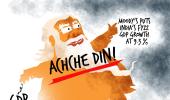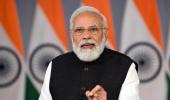Citing faster-than-expected recovery, rising consumer confidence and the resultant spending spike, Swiss brokerage UBS Securities has revised upwards its growth forecast for the current fiscal to 9.5 per cent from 8.9 per cent in September.

The brokerage also sees the economy clipping at 7.7 per cent in FY23 but moderating to 6 per cent in FY24, as it expects the benefit of the low-interest rate regime to end by the end of FY23, and it sees the central bank hiking policy rates by 50 bps in the second half of the next fiscal.
The Reserve Bank also forecasts 9.5 per cent GDP growth this fiscal while the average projection ranges from 8.5 to 10 per cent.
The government projection is around 10 per cent.
The GDP grew 20.1 per cent in the June quarter of FY22.
In its September review, UBS said on a seasonally adjusted sequential basis, the real GDP declined by 12.4 per cent in the June quarter against the -26 per cent in the same period last year.
Therefore, we maintain the base case estimate of GDP growth at 8.9 per cent in FY22 compared to the consensus of 9.2 per cent against the deeper 7.3 per cent contraction in FY21, UBS Securities said.
The economy is bouncing back on progressive reopening, and the recovery from the second wave has been more pronounced than what we anticipated, Tanvee Gupta Jain, the chief economist at UBS Securities India said on Wednesday.
Therefore pencilled in a higher-than-expected GDP run this fiscal.
Without giving an exact number, she said the economy will grow by 9-10 per cent in Q3 and 6-6.5 per cent in Q4 this fiscal, leading to higher overall full-year growth.
Gupta-Jain told reporters in a concall that she sees real GDP clipping at 9.5 per cent this fiscal, up from 8.9 per cent forecast earlier, 7.7 per cent in FY23 -- which is more optimistic than the consensus 7.4 per cent for the year, but the growth momentum will moderate to 6 per cent in FY24 as the output gap will remain negative amidst the global growth engine slowing down.
Their optimism comes from their internal UBS India Activity Indicator data, which suggest economic activity has improved sequentially by an average of 16.8 per cent in the September quarter after contracting 11 per cent in the June quarter.
Even for October, the indicator was up 3.1 per cent month-on-month on the festive demand bounce.
The brokerage bases the more-than-consensus growth optimism on the following: though consumption growth may moderate measures to boost public Capex and early signs of a recovery in the residential real estate sector may offset some of the adverse impacts.
Similarly, exports could also moderate next year from the very high rates this year due to a shift from goods to service consumption at the global level as the pandemic recedes.
They also see a potential credit accelerator effect in the country aiding the recovery.
The baseline assumption is that activity continues to normalise, and remaining mobility restrictions are gradually removed.
Downside risks to the outlook include the following: a mutant virus that is resistant to vaccines is the biggest downside risk, as it may leave the government no choice but to begin new mobility restrictions, another could be a more than the expected spike in inflation and the resultant hike in repo rates to the tune of 75 bps next fiscal.
If both materialise, then FY23 growth will be much lower at 5 per cent, she said.
And the upsides would be a successful and timely implementation of the recently announced structural reforms boosting growth beyond our baseline forecast, which will also lead to the economy closing the output gap faster.
According to the brokerage, potential growth has slowed to 5.75-6.25 per cent currently compared to over 7 per cent in 2017, due to longer-than-expected disruption caused by the pandemic and balance sheet concerns faced by economic agents.
Beyond FY22, Gupta-Jain believes Capex, especially infrastructure spending, manufacturing and exports will be the next key growth drivers.
On inflation, she expects CPI to decelerate to 4.8 per cent in FY23 from 5.4 per cent in FY22, assuming the RBI gradually starts unwinding its ultra-easy policy as the economic recovery gains momentum. In a base case scenario, she expects a policy rate hike of 50 bps in H2 FY23.
On the fiscal front, she expects the government to remain committed to fiscal consolidation and narrow the deficit to 8.8 per cent in FY23 from 10.1 per cent in FY22.
Photograph: Anushree Fadnavis/Reuters











 © 2025
© 2025